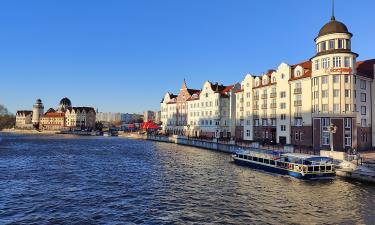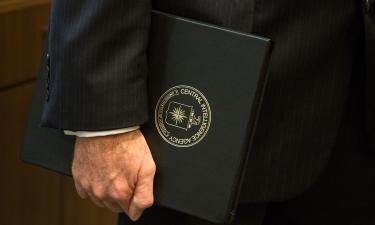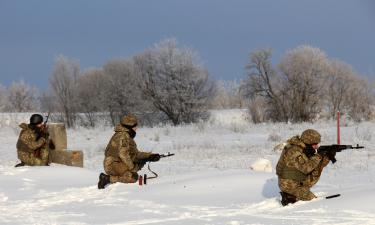US-Russian relations: Lost in translation
Russia responds to US criticism when the source of criticism is not around
The US Secretary of State made her visit to Russia on April 19-20th. Condoleezza Rice conducted negotiations with Russian Defense Minister, Sergei Ivanov and Foreign Minister Sergei Lavrov, and also had a meeting with President Vladimir Putin. Ms. Rice's visit to Moscow became a preparation to a more important US-Russian even, which is to take place on May 9th, when American President George W. Bush visits Moscow for Victory Day celebrations. As it became clear after Condoleezza Rice's visit, the number of contradictions still remains the same between Russia and the USA, as they could be seen on the threshold of the Putin-Bush summit in Bratislava. 
The USA has chosen a special tactics of talks with Russia: American officials prefer to criticize the Russian administration before and after the talks. When Russian and American officials appear at a press conference, though, they prefer to talk about common interests and strategic partnership between the USA and Russia. Russia responds to criticism when there is no source of criticism around. It could be seen after the Bratislava summit, when Russian and US administrations exchanged several harsh statements prior to the talks, but regulated all moot questions during the summit.
Condoleezza Rice stated on her way to Moscow that she was particularly concerned about the strengthening of power in the hands of the Kremlin and the pliancy of Russian media outlets. Ms. Rice virtually accused the Russian president of concentrating power in his hands, reducing the role of the parliament and of the judicial power. To crown it all, the US Secretary of State set out a hope that Vladimir Putin would retire in 2008 and would not be making any attempts to be reelected for the third time. The USA's attitude to Russia toughened after Ms. Rice took the office of the Secretary of State: it became more sensitive pertaining to internal political changes in the country. In addition, the US administration is concerned about other Russia-related issues: the problem of accessing Russian nuclear objects, the military cooperation with countries from the “axis of evil” and the competition between the USA and Russia on the post-Soviet state.
Problems remain on all three positions between the countries. Rice stated in her interview with the Echo of Moscow radio station that she had managed to come to agreement with Russian Foreign Affairs Minister, Sergei Lavrov, to provide more access to US specialists on Russian nuclear objects. Defense Minister Sergei Ivanov rejected Ms. Rice's statement soon after that, though. Mr. Ivanov stated that the question about US specialists visiting nuclear objects of Russia was not being considered.
Condoleezza Rice and Foreign Affairs Minister Sergei Lavrov discussed the problems of reforming the OSCE. It became clear that the USA and Russia have a different perception of the role that the organization plays in the world. Russia criticizes OSCE's pro-Western stance in regulating conflicts in the countries of the former Soviet Union, as well as its approach to the estimation of democratic elections in the Commonwealth of Independent States. To all appearance, Lavrov and Rice failed to come to a certain agreement during the talks: Ms. Rice commented the conversation with the Russian minister with abstract phrases only.
The attitude to revolutions on the post-Soviet space and the freedom of mass media became the central subject of Condoleezza Rice's negotiations with Sergei Lavrov. The officials started the discussion in Ankara, during preparations to Putin-Bush summit in Bratislava. Rice accused Russia of violating freedom of press, whereas she added during her latest visit to Moscow that the USA was not the only country that had concerns about the situation with mass media in Russia. Russian Foreign Affairs Minister, Sergei Lavrov stated in respond that one could definitely discuss the issue of freedom of press in Russia, although it would be hard to do it without any examples.
Commenting Ms. Rice's remark about Belarus as the last regime of dictatorship in Europe, Sergei Lavrov said that one should not develop democratic principles from within. “We do not back a forced change of regimes,” the minister said. Dmitry Bulakhov, first deputy executive secretary of the CIS, believes that Condoleezza Rice's remark about Belarus did not comply with the norms of international right. “There is no country in the world, which can dictate its will on sovereign states,” said he.
Condoleezza Rice's meeting with President Vladimir Putin looked warm. Addressing to the US Secretary of State, Putin said: “The relations between Russia and the USA have been taken to the high level, at which they are now, at your direct participation.” Putin added quickly: “We hope that the course will be continued from both parts, including from the part of the USA.” At the meeting in the Kremlin, Putin and Rice discussed the situation in Kyrgyzstan, regional stability questions, anti-terrorist struggle and so on. Condoleezza Rice later said in her interview with Vilnius-based TV company Fox, that Vladimir Putin was a patriot of Russia and a strong leader.
The USA has been intensifying its pressure on Russia recently, criticizing the internal political situation in the country and weakening its geopolitical positions. It is obvious, however, that the USA does not want to spoil the relations with Russia: it would be much harder for the States to strive for concessions, especially on the issue of accessing Russian nuclear objects. Russia must preserve the status of the anti-terrorist coalition member, while the USA is supposed to remain one of Russia's basic partners.
Tatiana Stanovaya
Subscribe to Pravda.Ru Telegram channel, Facebook, RSS!




